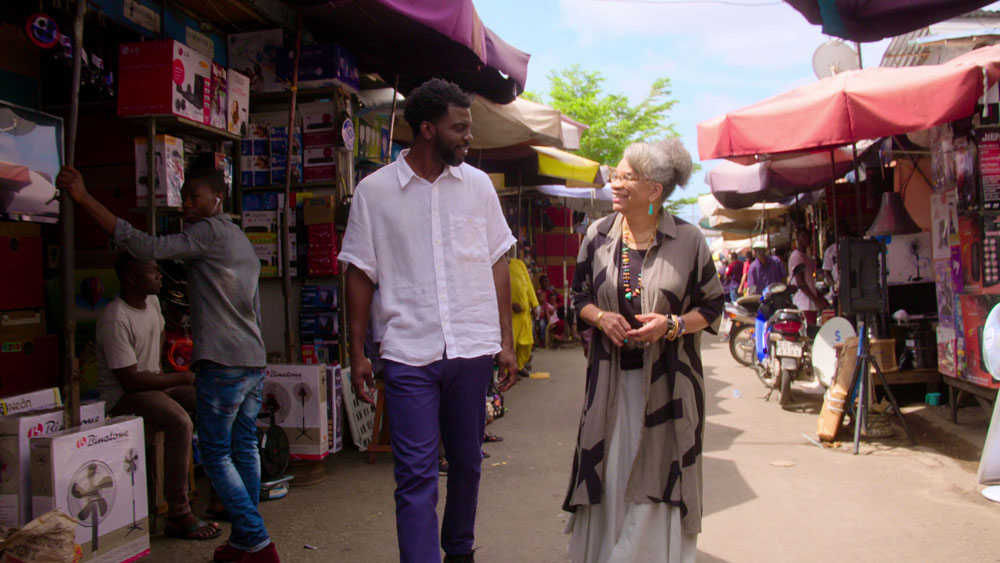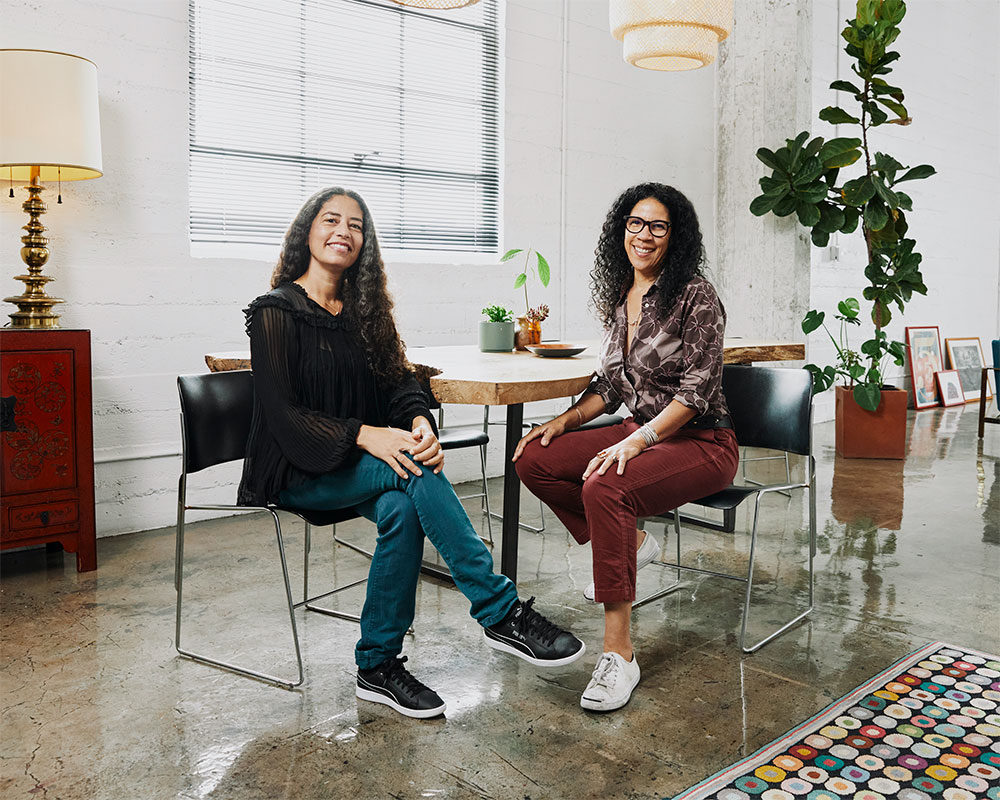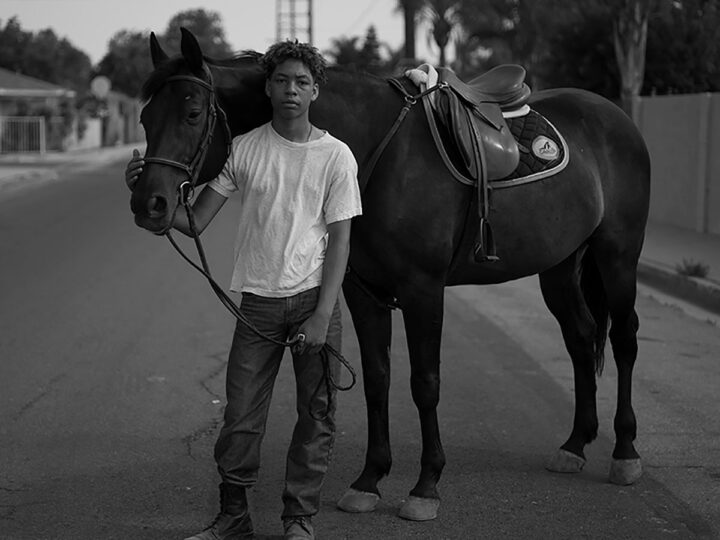The Netflix series “High on the Hog: How African Cuisine Transformed America,” is an absolute revelation. It is a joyful and emotional exploration of Black cooking, beginning in Africa and continuing straight through to what’s on the plate today, but it shifts the paradigm from what you’ve come to expect from discussion of Black history: the talent here demonstrate how their craft, and not just their labor, is shaping this country.
For show creators and producers Fabienne Toback and Karis Jagger, calling out that craft is a pathway to the future. When they read the culinary history, High on the Hog, the 2011 book by award-winning cookbook author and historian Dr. Jessica B. Harris, they found much more than an archival tale of African foodways and cooking in America. They found a direct line straight into the heart of Black creativity and its influence on our whole culture right now.

Culinary historian and cookbook author Jessica B. Harris and host Stephen Satterfield walk the markets in the West African country of Benin in Episode One of “High on the Hog: How African American Cuisine Transformed America.”
The ways that we eat have many tangled roots, and tracing them is such a pleasure! The producers were no strangers to history and media production, having run the popular blog Hey Sistah! and produced short-form content for the New York Times. But they were stunned by things they didn’t know about their own culture.
“There were millions of things we didn’t know,” said Jagger when all three of us got on a Zoom call from our homes in Los Angeles. “I didn’t even know that the South was built on the wealth created by rice, and on the [rice-growing] acumen of slaves coming over from Africa. And I went to Yale. I’m Black. How absurd that, at my age, I didn’t know that?”
The show, like the book, starts in the small country of Benin, from which over a million Africans were sent in chains to the New World. Host Stephen Satterfield, the engaging and thoughtful creator of Whetstone magazine, joins Dr. Harris for a shattering visit to the Gate of No Return, where slave ships were loaded. But that’s not the whole encounter they were seeking; they’d come to find what’s cooking.
“This is us,” Dr. Harris says to Satterfield as they look at okra stacked in a Benin green market. “This is the connector.”
Okra, along with rice, melons, peanuts, yams, red palm oil, fish dishes and other foods carried over from Africa, became the rice-based cuisine of the lowcountry coastal regions of the Carolinas, where rice was the first American export crop, and which made the U.S. rich.
As Satterfield and Harris dine with cutting-edge African chef Sedjro Ahouansou making Beninese cuisine new, and then with American rice producers and chefs including Gabrielle Etienne honoring and reinventing lowcountry dishes in the U.S., we see that this single, ancestral line of creativity and influence is one thread of the future of how we will eat. And those threads are many.
The four short episodes of Season One of “High on the Hog” pick up other geographical threads in Texas and Philadelphia and New York, all of them full of astonishing culinary histories most of us never knew.
In Episode Three, for instance, we explore the work of Hercules Posey, who was the chef for George Washington, and James Hemings, who was the chef for Thomas Jefferson. The fine food of both of these enslaved men was world-famous among presidential guests and international statesmen and is still celebrated today; Hemings was trained in France and when he came back to cook at Monticello he brought with him a potager or “stew-stove,” which changed household cooking in the U.S. His haute cuisine also had a homey side: he was well-known for a decadent dish he called “macaroni pie,” which we now know as mac & cheese. Celebrated chefs Martin Drulack and Brian Dunsmore (whose new restaurant, Dunsmore, is now LA HOMEFARM’s neighbor) explain how they held a series of events in LA called the Hemings & Hercules dinners, in which they recreated their recipes and celebrated their legacy.
In Philadelphia, we revisit the legacy of Robert Bogle, a free Black man, who created a celebrated catering company that gave rise to an industry and a Guild of Caterers dominated by Black families for 150 years. The menus of one of these families, the Dutrieuilles, shows dishes heavily influenced by the experience of slavery and poverty, including Pepperpot Stew, called the most popular dish in Philly, which was made with tomato and Scotch bonnet and oxtail, an off-cut that had been apportioned to slaves and would be inexpensive at the butcher shop.
Another episode tells the story of Thomas Downing, “The Oyster King of New York,” a Black man whose oyster restaurant was the go-to place for Wall Street in the late-1800s, and how that empire was built on an entire community of free Black oyster purveyors called Sandy Ground, on Staten Island. In another, we learn about the Black history of the cowboy, which arose from slave culture and gave rise to America’s enormous beef industry and the proud tradition of regional BBQ.
In each instance, the show brings us into the present by talking about who is cooking BBQ now, such as Greg Gatlin at Gatlin’s BBQ in Houston or pastor and pitmaster Clinton Edison from New Zion Baptist Church. We meet Ben Harney, the Real Mothershucker, who has an oyster cart in Brooklyn. And Chris Williams at Lucille’s in Houston, who says, “The limitations that are put on us by people’s framing of what Black hands can do is exhausting.” He adds, “We’re the innovators of everything that is pop culture right now.”
As noted chef Omar Tate works up a version of Thomas Downing’s oyster stew, he talks about how he seeks to “deframe” Black cooking and make it a practice of constant invention, because “Africans liberated themselves through craft.” That is the through-line of the entire series.
And very soon there will be more: the second season of “High on the Hog” is now in post-production and is expected to drop in 2023. Toback and Jagger also recently signed a first-look deal with Lionsgate, which has sent them deep into the development of new projects. As we all await Season Two, we talked about the importance of being recognized for the things we make.

Karis Jagger, left, and Fabienne Toback, executive producers and creators of “High on the Hog: How African American Cuisine Transformed America.”
Dean Kuipers: The blog, Hey Sistah!, was at least partly about food. Why food? Why did you zero-in on that as a subject?
Karis Jagger: You know, Fabienne and I met when we were pregnant with our older kids together. We were avid travelers around Los Angeles and we were also avid cooks. Fabi has been trained professionally. It was a shared passion. We would cook for each other, we’d cook for our families. We did a little series for The New York Times that was lifestyle before we jumped into food, but definitely food has always been a love that we’ve shared together.
Dean Kuipers: Food is an entry point to get into so many things. How did you come across this particular book, High on the Hog, by Jessica Harris – or Dr. J, as Stephen calls her?
Fabienne Toback: It was during a time the world was really changing, after the murder of Michael Brown. We had been in The New York Times with that lifestyle content; we wanted to dig into something deeper. The kids were a little bigger, they didn’t need the same sort of – drop off at school, go make a movie, and then run back and pick them up.
Around that time, our mutual friend Jeff Gordinier sent us the cover of the book and he said, simply, “Read this book. It’s going to change your life.” We both read the book in one sitting, and we knew this was a story for us to tell. My kids are dark, like myself, and you start seeing [the world through] your kids.
Karis Jagger: Her book enlightened us to so many stories that we didn’t know and we felt if we didn’t know them, surely there was a whole array of other people out there who would benefit from knowing the stories too. There were so many “ah-ha” moments when we were reading the book and it just seemed like it would translate into a great series. Not that we didn’t have to pound the pavement for a long time to convince someone else of that.
Dean Kuipers: Of course you did.
Karis Jagger: Let’s not pretend that it was some seamless, easy process.
Fabienne Toback: It’s also such a story of empowerment and resilience and strength and it’s also a feel-good story around food and race and culture. Yeah. It hit on all cylinders.
Dean Kuipers: It certainly does. Here’s all this stuff that Black culture created in America, or brought over from Africa, that people don’t know about, all these “ah-ha” moments. Why is it important that people know about these things?
Karis Jagger: It’s rewriting history, isn’t it? We get all this information in books as children and we think that that’s what it is, and then you dig deeper and you realize that’s not true at all. Fabi and I feel it’s our job now to keep retelling stories that people think they know.
Fabienne Toback: Stephen says it quite eloquently in the series: the narrative that gets pushed is that the country was built on Black physicality, and it’s really on the intellectual know-how. We’re seeing now, with the curriculums that are being taught in schools, how important those stories are for personal sense of self-worth. For my kids, it’s an important narrative for them to know. There’s a lot of – for lack of a better word – slave porn. This sort of narrative, like, “Oh, they were just used as pack mules.”
For instance, James Hemings, who brought over our modern stove, who was fluent in five languages, who traveled – these are important stories for resiliency and for that fire that burns within all of us, that we are of value, that we are important, and our contributions can’t be swept under the rug.
Dean Kuipers: Especially with a new bunch of people trying to push stuff under the rug.
Fabienne Toback: Yeah. Exactly.
Karis Jagger: People didn’t really want us to go to Benin, because they hadn’t really heard of it. They are like: we could go Senegal. They would rather us go to a larger African country, and we’re like: that’s not the point. The point is to tell people that there is this country out there, that was an important piece of our history and connectivity – not to just ignore it because they speak French there. But that’s education, and I guess Fabi and I are nerds like that.
Fabienne Toback: We like to travel.
Karis Jagger: We like to speak French if we can.
Dean Kuipers: Moi aussi.
Fabienne Toback: It was kind of crazy. When we get to Benin, Karis and I were the only people who spoke French on the crew. Okay, the EPs [Executive Producers] are here and they’re actually useful? We were craft service, money changers, translators.
Dean Kuipers: One of my favorite moments in the series is when Omar Tate said – and I’m paraphrasing – that Black people or Africans liberated themselves through craft. Wow.
Fabienne Toback: That’s a great line.
Karis Jagger: Farming, tenacity – there’s so many things that we couldn’t even put in the series that you want to describe this, but, emotionally, we wanted to have joy and we wanted to have sadness and I think that was tonally very important to Fabienne and I. It’s empowering and it’s really joyful. I think that enables people to feel pride.
Fabienne Toback: Yeah, which is what I love.
Dean Kuipers: And joy is what we associate with cooking, right? The book is not called The Drudgery of Cooking. It’s fun to eat.
Karis Jagger: Unless you’re doing Oliver Twist or something.
Dean Kuipers: I suddenly see a dance part in your show, like “Food, Glorious Food,” they just break out …
Karis Jagger: You never know, Dean.
Fabienne Toback: That’s a good idea. We got to push on that.
Dean Kuipers: How did you choose Stephen to be your host?
Fabienne Toback: Karis and I sat with the book for about six months and dissected it to the second, and our great friend Jeff Gordinier was constantly like, “You should meet this person and that person. Here’s their number.” Stephen is the publisher of Whetstone and Jeff’s like, “He’s going to be in town. You should meet him.” I had breakfast with him and he was carrying his backpack, giving out his Whetstone magazine, and he said, “Listen, anything I can do to help you guys would be great, I’m there for you.”
Initially, we were going to do a bunch of different bloggers and people in the food world. But he’s so amazing. Karis always says that what he brings to the show is a different voice; we wanted someone who was well-respected in the food industry and he comes with so much background and respect.
Karis Jagger: He was really familiar with Dr. Harris’ work and he was very respectful of her. He insisted we actually make sure it was fine with her that he was the host.
Dean Kuipers: He’s wonderful, because he’s still surprised by things. He’s exploring, and so you get to explore with him. And it matters how he feels about the food. There’s some authority there and if he says, “Mmm. This is good,” there is some relief in the room.
Karis Jagger: I can’t say that he loved the cowboy stew.
Dean Kuipers: I was with Lauri and she goes, “No, no, I’m not eating that.” I said, “I’ll eat it.” She goes, “That’s for you then.”
Fabienne Toback: There’s also the way they shot it.
Dean Kuipers: No. I don’t know if you can actually improve that visually.
Karis Jagger: Exactly.
Dean Kuipers: I think it was Michael Twitty, in the show, who talked about the term “soul food,” and said this food is about a communication between souls: the living, who are cooking, thinking about their ancestors and then thinking about those not yet born.
Karis Jagger: He’s so eloquent and he speaks so beautifully to the hearth cooking, that episode was so beautiful. I can’t even remember if it’s in the show now, but he has a piece of pottery that he carries around from the period to remind him about the way food was cooked and his ancestors.
Fabienne Toback: And it’s a piece of china pottery, and it’s like that they were worthy to eat out of beautiful dishes. I think the pottery piece maybe was from Monticello or it was from somewhere where it was just in the dirt. It’s a wonderful reminder to keep pushing forward for the next generation.
Dean Kuipers: All the people in the show are so skilled at what they do, whether it’s cakes or BBQ or whatever, and yet there’s a kind of an anticipation on all of their faces that something here is going to change. What is the change that’s still wanted? A lot of these people are successful but there’s still a feeling that something needs to go further.
Fabienne Toback: Black Lives Matter. It’s as simple as that. It’s just that we matter, that we’re here, and this is our country, as well. You know? The food and the culture that we bring is American culture. I think … I’m going to cry. [pauses] We want to be recognized for the contributions that we make and have made and continue to make.
Karis Jagger: Also, it’s like people bringing their history forward – Lucille’s in Houston. [Lucille B. Smith started the restaurant and a food service training academy and published a collectible 1941 recipe box collection called Lucille’s Treasure Chest of Fine Foods.] It’s recognizing that we’re here on the strength of our grandmothers and grandfathers and making sure people know that.
Dean Kuipers: Another great part of this show is that it gets into some of the actual food crops that came from Africa. One of the few Black people that was in my history book growing up was George Washington Carver, right? But I don’t remember it saying that peanuts came from Africa. Everything just gets so covered up.
Fabienne Toback: It’s by design. It just makes it a neater history. I mean, it’s kind of along the lines of this whole notion of “Sub-Saharan Africa.” That’s kind of made up. Egyptians are Africans. It was designed as a way to say, ‘Well, these people who did the pyramids, those are obviously intelligent people. Therefore, we need to make a different sort of classification of why we’re treating these other people really horribly.”
George Washington Carver and the contributions he made to our agricultural world is overlooked. That’s a whole other series!
Dean Kuipers: Congratulations on your new deal with Lionsgate. That’s amazing!
Fabienne Toback: It’s been such a wonderful journey. Karis and I have been working together in this capacity for just over a decade. Some people are like, “Are you surprised?” But I think we’ve always held this sort of vision for ourselves in what we wanted to do, and so it feels almost relaxed.
The material is the inspiration, the projects that we’re working on. We have a really good time working together. We laugh a lot. We’re like, “Oh my gosh. We’ve got offices.”
Karis Jagger: We’re still excited about so many things.
Fabienne Toback: Karis will laugh when I say this but, as middle-aged women –
Karis Jagger: You’re the one who always says you’re not middle-aged. I’m definitely middle-aged.
Fabienne Toback: I’m definitely middle-aged now as well. A lot of people are looking at what are they going to do to wind up their careers. But we are just getting going. The kids are big and it’s just a really exciting time in our lives to do this. We hope that becomes an inspiration for women.
Karis Jagger: One of the greatest gifts for us for doing this show was Jessica got to be a Time 100 person of the year and her book was on The New York Times best-seller list and it had not happened before.
Dean Kuipers: Any hints about what kind of material you’re looking for? I wouldn’t assume that it’s all food-related stuff?
Fabienne Toback: We have a couple more food-related projects. We’re not worried about over-food-ing. We have some other sort of narrative projects, but they’re all based on our interests and passions. Hidden stories are really important to us. Women are really important to us. Black people are really important to us. That kind of gives us a wide berth of all the possibilities that are out there.
I mean, Jessica’s book had been out for like a decade before we picked it up. We got the book and we were like, “Oh my God. Someone is going to do this book.”
Karis Jagger: Well, it seemed so obvious, we were like, “Someone’s got to have bought this.” But the agents were like, “No. No one has even called.”
Fabienne Toback: No one has even called!
Karis Jagger: Only you knuckle nuts think that this is a good show.
It is a good show. A fantastic show. Watch it and learn about the beautiful roots of the food you eat every day.


